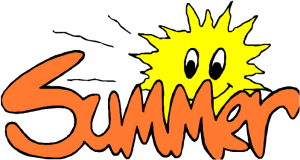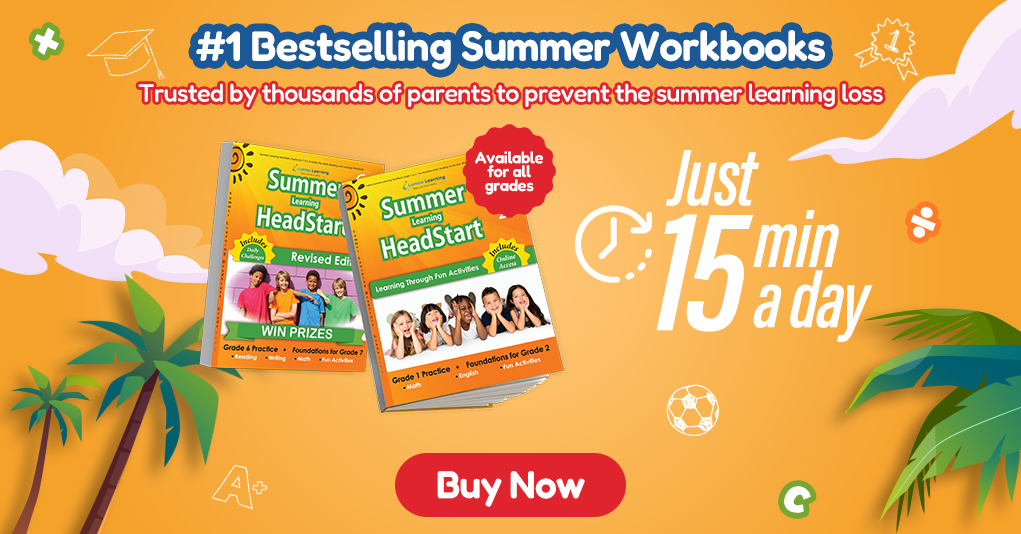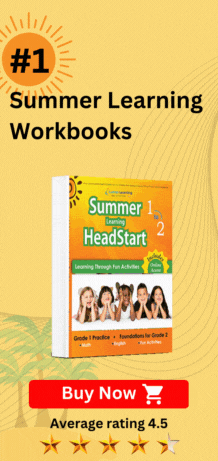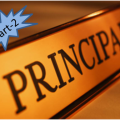Take a few moments today to reflect on your summer thus far, and use that information to ensure that you spend the next several weeks following through with your plans – so you return to the classroom this fall refreshed and invigorated!
Daily Summer Practice
Download Free Worksheets NowCheck-in with your goals.
When I say, “goals” I’m not talking about lesson plans or intricate mission statements. I’m simply referring to what it is that you envisioned you’d be doing during your summer break. It may involve tutoring, taking a vacation, taking part in professional development, working at a summer job, or just relaxing. It doesn’t really matter if your goals are professional or personal – or a combination of the two. What is important is to have an idea of what you’d like to get out of the summer to feel that you’re ready to return to the classroom in a few short weeks.
Fun and Educational Summer Workbooks
Prevent the learning loss in just 15 minutes per day
Revise and Edit.
Based on your self-assessment, how close is your original vision for summer vacation matching up with what has transpired actually? If you’re aligned with what you desired, then you have a good chance of feeling accomplished, relaxed, and/or satisfied that you’ve had the opportunity to do what you wanted or planned. If, on the other hand, you find summer slipping away without any follow-through, it’s time to make some adjustments.
For instance, if you were looking forward to quality time with your children but realize that hasn’t happened, what can you do to change that? Maybe you want to schedule in times that you are going to devote to family only, and you’ll work the rest of your schedule around it. Or maybe a weekend away with the kids is in order.
But let’s say you haven’t reached your “goal” because it was unrealistic, or your priorities have changed. In that case, accept that what you thought you wanted or were going to do has shifted. That’s okay. It’s only if you beat yourself up with “should haves” that you’re less likely to be satisfied with how you spent your time.
A quick example may be that you planned to read several books in your field this summer. However, you’re beginning to realize that you may not have time to get through the seven books you planned to read and still do the other things you wanted to do. It would be a perfect time to readjust your goal. Maybe reading 3 or 4 books are more realistic. That way, you will not only have time for other pursuits but also get to concentrate on the several books you do choose to read – without feeling like a “failure.” Remember, there’s always more time later! This isn’t a matter of giving in or being lazy. Think about differentiating your lessons for different students’ needs: you meet the child where he or she is. You’re simply differentiating your summer to meet your needs!
Gear Up.
Professionally, determine what you need to do to feel prepared and motivated to begin the new year. List all the items, and then break the list down into smaller segments. You may wish to divide the items into weekly or daily tasks. By making your to-do list more manageable, you’ll be less overwhelmed – and more likely to follow through.
For example, if you want to plan the first week of lessons, revamp your classroom management plan, and create new bulletin boards, you might decide to take the next week or two to brainstorm and gather the supplies for the bulletin boards. Then, you’ll take the following two weeks to work on the management plan. Lastly, you’ll devote two weeks to lesson planning. Or maybe you’ll do a little bit in all three areas every day. Whatever you decide, make it work with the rest of your schedule, and be sure to balance personal time and other family responsibilities into your master plan.
A Little Sunshine All Year
 Finally, decide how you can infuse the summer spirit into the rest of the school year. It can be a great pick-me-up in the stressful months – during report card time, at parent-teacher conferences, or in the midst of the winter doldrums. All you need to do is identify what it is about the summer that you love the most. Is it taking a midday nap? Getting out in the sunshine? Regularly Exercising?
Finally, decide how you can infuse the summer spirit into the rest of the school year. It can be a great pick-me-up in the stressful months – during report card time, at parent-teacher conferences, or in the midst of the winter doldrums. All you need to do is identify what it is about the summer that you love the most. Is it taking a midday nap? Getting out in the sunshine? Regularly Exercising?
Whatever you decide is your #1 summertime pleasure, see if you can’t work in some of that enjoyment into your work day. If you love doing morning yoga, then try to carve out a few days a week to continue during the school year. Sure, you may need to wake up earlier, but imagine how much enjoyment you derive from this activity.
If it’s sunshine and warmth you’re after, consider a 10-minute walk outside on your lunch break to soak up the rays. If it’s a good book or nap you crave, try to plan for some shuteye or reading time right after school, before you move onto the rest of your evening.
With a little bit of forethought, you can not only get the most out of your time today but also return to the classroom with a spring in your step and a positive attitude, ready to meet the challenges that the beginning of each new school year has to offer!
Before I sign off for this week, I’d like to leave you with a list of activities that many teachers enjoy doing during the summer months. Please comment below with any ideas you’d like to add to our list!
Personal/Family Activities
- Taking a vacation
- Taking day trips to a park, museum, or the beach
- Visiting the library or a book store
- Going to yard sales and flea markets
- Reading a pleasure book or magazine
- Shopping
- Playing a sport or musical instrument
- Indulging in a hobby or craft
- Pursuing a new hobby
- Getting outdoors
- Planning a picnic or get-together with friends/family
- Watching TV/movies
- Doing home improvement projects/yard work/gardening
- Going to the pool
- Learning a foreign language
Professional Activities
- Catching up on professional reading
- Planning new lessons
- Revising and improving upon past lessons, power points, etc.
- Attending professional development workshops and seminars
- Taking part in summer committee work
- Teaching summer school
- Tutoring students
- Planning a field trip or assembly for the next school year for your class
- Meeting with co-teachers to plan for the upcoming year
- Planning bulletin boards/classroom layout
- Revamping classroom management routines and procedures
- Doing online research for materials, books, and other resources/ideas










Pingback: Make the Most of Summer: Ideas for Teachers | Think Educative